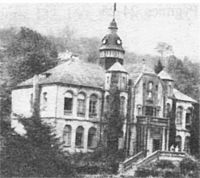Jesko from Puttkamer

Jesko Albert Eugen von Puttkamer (born July 2, 1855 in Berlin , † January 23, 1917 in Charlottenburg ) was a German colonial official, governor of Cameroon and imperial commissioner of Togo .
Life
Von Puttkamer came from a noble Pomeranian family . He studied law in Strasbourg , Leipzig , Freiburg i. Br. , Breslau and Königsberg . After passing his legal traineeship (1881), he entered the consular career and was assigned to the Imperial Consulate in Chicago in 1883 . In 1884 he moved to the Foreign Office for further training and in May 1885 was appointed Chancellor of Cameroon and Deputy Governor Julius Freiherr von Soden . In July 1887 he became interim commissioner for the German colony of Togo (today Togo or part of Ghana ), in August 1888 consul in Lagos and in 1889 again imperial commissioner for Togo, from 1893 with the title of governor. As successor to Eugen von Zimmerer , he took over the business of the central administration on January 1, 1895, and was appointed governor of Cameroon on August 13, 1895.
His term of office was dominated by the expanding plantation industry around the Cameroon Mountain , which he massively promoted. He also supported the granting of concessions to the Society South Cameroon (GSK) and the Society Northwest Cameroon (GNK) in 1898/1899, which was hostile in the Reich . On Puttkamer's initiative, the seat of government was moved from Douala to the healthier Buea on Mount Cameroon (1901). The governor's palace built by him there (so-called "Puttkamerschlößchen") earned him severe criticism because of its lavish furnishings. In the years 1898 to 1903 the Imperial Protection Force occupied the entire protected area up to Lake Chad , with the war against the Emir of Adamawa and the occupation of the countries of Chad by the commander of the protection force, Lieutenant Colonel Pavel , albeit against Puttkamer's express orders. While in the first years of his tenure he was still a representative of a rigid policy of conquest, as the expeditions against the Abo, Kpe and Bakoko (1894–1896) show, he turned under the impression of increasing problems with the military administration in the hinterland and his own, The open conflict with the officer corps of the Schutztruppe abandoned the idea of violent expansion and sought a non-military integration of the indigenous societies into German sovereignty.
Because of its controversial concession policy, but above all because of its rigid, autocratic style of rule ("Puttkamerei"), which u. a. In 1906, which led to a petition from the Akwa clan to the “most serene, most gracious German Reichstag Berlin”, which pointed to the grievances in Cameroon, Puttkamer came under considerable public pressure. Among other things, the colonial administration under his aegis was accused of arbitrary expropriations, forced relocations and a considerable degree of brutality. The imposition of draconian prison sentences on the signatories of the petition eventually led to a political scandal . The center and the Social Democrats denounced Puttkamer's mismanagement, whereupon he was ordered back to Berlin to report, which amounted to his dismissal. Tellingly, Puttkamer's dismissal was not based on the above-mentioned allegations, but rather on a few minor affairs that he was guilty of, such as a passport forgery in favor of a lady with whom he was better known. Jesko von Puttkamer was put into temporary retirement on May 9, 1907 and retired in 1908.
In 1914, at the age of 59, von Puttkamer married Elisabeth Passow, who was more than 30 years his junior . The marriage resulted in a son who, however, died after a few months in June 1915. In 1917 von Puttkamer committed suicide. It is believed that the loss of his only son induced him to do so.
Fonts
- Gubernatorial years in Cameroon. Berlin, Georg Stilke, 1912.
literature
- Ralph Erbar: Puttkamer, Jesko Freiherr von. In: New German Biography (NDB). Volume 21, Duncker & Humblot, Berlin 2003, ISBN 3-428-11202-4 , p. 21 f. ( Digitized version ).
- German Colonial Lexicon. Volume 3. Leipzig 1920, p. 117. ( online )
- Florian Hoffmann: Occupation and military administration in Cameroon. Establishment and institutionalization of the colonial monopoly of violence 1891–1914. Göttingen 2007.
- Andreas Eckert : Cameroon as a German colony. In: Back then. Magazine for history and culture. February 1996.
- Ellinor von Puttkamer (editor): History of the sex v. Puttkamer. (= German Family Archives, Volume 83-85). 2nd Edition. Degener, Neustadt an der Aisch 1984, ISBN 3-7686-5064-2 , pp. 695-696.
- Jürg Schneider: Berlin-Cameroon: The governor and a Berlin half-world lady, in: Ulrich van der Heyden and Joachim Zeller (eds.): Colonialism in this country - A search for traces in Germany. Sutton Verlag, Erfurt 2007, ISBN 978-3-86680-269-8 , pp. 195-200.
estate
Puttkamer's estate is in the Berlin Federal Archives (N 2231).
Web links
- Literature by and about Jesko von Puttkamer in the catalog of the German National Library
- Works by and about Jesko von Puttkamer in the German Digital Library
- Newspaper article about Jesko von Puttkamer in the press kit 20th century of the ZBW - Leibniz Information Center for Economics .
- Jesko von Puttkamer on the side of the association of the von Puttkamer family
Individual evidence
- ↑ Holdings details in the estate database of the Federal Archives.
| personal data | |
|---|---|
| SURNAME | Puttkamer, Jesko from |
| ALTERNATIVE NAMES | Puttkamer, Jesko Albert Eugen from |
| BRIEF DESCRIPTION | German colonial official and governor of Cameroon |
| DATE OF BIRTH | July 2, 1855 |
| PLACE OF BIRTH | Berlin |
| DATE OF DEATH | January 23, 1917 |
| Place of death | Charlottenburg |
